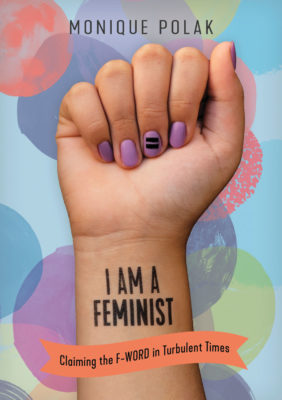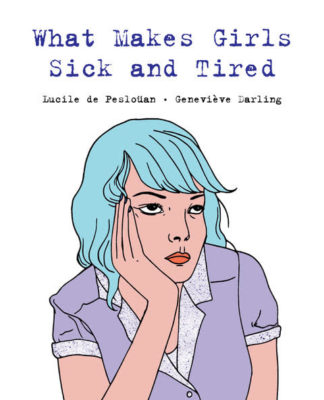“Feminism is not a done deal,” Monique Polak writes in I Am a Feminist: Claiming the F-Word in Turbulent Times. She doesn’t need to tell me twice. In fact, I’d argue that we need intersectional feminism more than ever before. Yet Polak is preaching to the choir: I’ve been a proud F-word for a while now. What about other readers?
One of Polak’s many successes is her book’s potential for broader appeal. Though this accessible guide is full of up-to-date statistics, examples, definitions, and resources, Polak still puts the “I” in I Am a Feminist. In addition to centring teenage voices by weaving in dialogues she’s had with several young men and women, she also incorporates personal aspects of her own history with feminism. From her struggles with self-image to surviving intimate partner violence, Polak’s voice is compelling, vulnerable, and never pedantic. Her openness, empathy, and “let’s find out together” attitude will win over even reluctant readers of any age.

I Am a Feminist
Claiming the F-Word in Turbulent Times
Monique Polak
Illustrated by Meags Fitzgerald
Orca Book Publishers
$19.95
paper
176pp
9781459818927
I admire that I Am a Feminist provides both historical and contemporary contexts for young Canadians in particular, profiling the likes of Montreal musician Emily Skahan; Canadian journalists Sue Montgomery and Antonia Zerbisias, the originators of the viral hashtag #BeenRapedNeverReported; and Nakuset, the executive director of Montreal’s Native Women’s Shelter. The book prioritizes intersectionality from the outset, with Polak discussing her own privilege, constructively critiquing white feminism, and introducing readers to Sojourner Truth, bell hooks, Rebecca Walker, Tarana Burke, and Patricia Hill Collins, among many others.
Running the gamut from reproductive rights to consent to how boys can be better allies and beyond, Polak examines each issue unflinchingly. She also focuses on action, highlighting feminists in our local and global communities who are enacting meaningful change, providing actionable steps to empower teens along the way.

What Makes Girls Sick and Tired
Lucile de Pesloüan
Illustrated by Geneviève Darling
Second Story Press
$13.95
paper
48pp
9781772600964
What Makes Girls Sick and Tired by Lucile de Pesloüan is a great resource for an already feminist-leaning person looking to start or continue a dialogue, but it doesn’t take it a step further. The short, illustrated manifesto does express a valuable feminist emotion mostly absent from Polak’s book: outright anger and frustration. There’s something liberating about the repeated refrain “girls are sick and tired,” which begins each new page like an incantation.
The book makes sure to clarify that the category of “girl” is wide-ranging, encompassing “gay girls, trans girls, queer girls, Indigenous girls, sad girls, sick girls, […] girls who are immigrants, racialized girls, […] girls with disabilities,” and so on. Though the book does a good job at telling readers why girls are fed up, it often fails to provide the appropriate context. While a few pages making specific claims, such as it taking a hundred more years to close the wage gap, do cite a single source, other issues float untethered.
For example, the extent of one page states: “Girls are sick and tired when they think about pre-pubescent girls being forced into marriage to men […] They feel sick […] for the women who are sold as mail-order brides.” Where is this happening? It’s oddly specific yet lacking nuance. I can imagine a teen not well versed in global socio-political issues having a difficult time engaging. Another page claims that girls with an “above-average body size” (what is an ‘average’ body size, anyway?) have a more difficult time finding a job, without any further discussion, example, or source cited. In my experience, moments like this encourage dismissiveness from people new to an idea and those who haven’t already adopted the F-word.
For the girls out there who are sick and tired: what can we do as feminists to mobilize our anger and frustration and transform it into activism and community building? We can be the arbiters of the change we wish to see in the world. We must move beyond dialogue. These are turbulent times, after all. mRb
Author photo of Monique Polak by John Fredericks
Author photo of Lucile de Pesloüan by Juliette Clémentine Aubin






“to mobilize our anger and frustration and transform it into activism and community building” or maybe transform it into war, hate and destruction. I think the last is more likely.